Online Courses On Recommender Systems
Online courses about recommender systems offer a more engaging and interactive learning experience compared to traditional textbooks. On this page, you’ll find a curated list of available recommender-system courses, with descriptions sourced directly from the respective MOOC platforms.
Table of Contents
Coursera
Recommender Systems Specialization
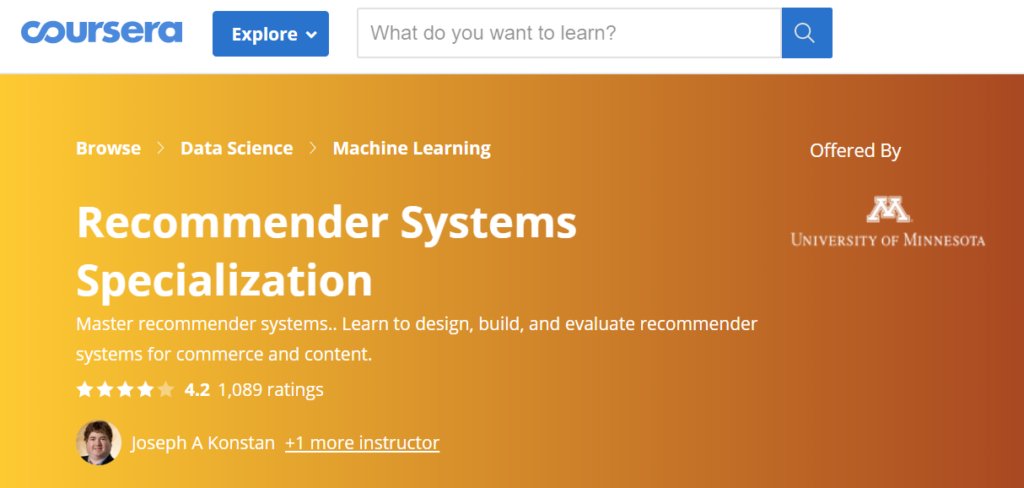
This course is offered by Joseph A. Konstan and Michael D. Ekstrand, two highly renowned professors in the recommender-system community.
The course is designed to serve both the data mining expert who would want to implement techniques like collaborative filtering in their job, as well as the data literate marketing professional, who would want to gain more familiarity with these topics. The courses offer interactive, spreadsheet-based exercises to master different algorithms, along with an honors track where you can go into greater depth using the LensKit open source toolkit. By the end of this Specialization, you’ll be able to implement as well as evaluate recommender systems. The Capstone Project brings together the course material with a realistic recommender design and analysis project.
Recommendation Systems with TensorFlow on GCP

In this course, you’ll apply your knowledge of classification models and embeddings to build a ML pipeline that functions as a recommendation engine.
• Devise a content-based recommendation engine
• Implement a collaborative filtering recommendation engine
• Build a hybrid recommendation engine with user and content embeddings
Machine Learning (with Recommender Systems Lectures)
Andrew Ng‘s Machine Learning course is likely the most popular online course about machine learning, and it features ~4 hrs lectures/tutorials about recommender systems. Given that Machine Learning is nowadays the key technology for recommender systems, this course is a worthwhile consideration (in addition or instead of the other courses listed here).

Machine learning is the science of getting computers to act without being explicitly programmed. In the past decade, machine learning has given us self-driving cars, practical speech recognition, effective web search, and a vastly improved understanding of the human genome. Machine learning is so pervasive today that you probably use it dozens of times a day without knowing it. Many researchers also think it is the best way to make progress towards human-level AI. In this class, you will learn about the most effective machine learning techniques, and gain practice implementing them and getting them to work for yourself. More importantly, you’ll learn about not only the theoretical underpinnings of learning, but also gain the practical know-how needed to quickly and powerfully apply these techniques to new problems. Finally, you’ll learn about some of Silicon Valley’s best practices in innovation as it pertains to machine learning and AI. This course provides a broad introduction to machine learning, datamining, and statistical pattern recognition. Topics include: (i) Supervised learning (parametric/non-parametric algorithms, support vector machines, kernels, neural networks). (ii) Unsupervised learning (clustering, dimensionality reduction, recommender systems, deep learning). (iii) Best practices in machine learning (bias/variance theory; innovation process in machine learning and AI). The course will also draw from numerous case studies and applications, so that you’ll also learn how to apply learning algorithms to building smart robots (perception, control), text understanding (web search, anti-spam), computer vision, medical informatics, audio, database mining, and other areas.
https://www.coursera.org/learn/machine-learning#syllabus
Udemy
Recommender Systems and Deep Learning in Python
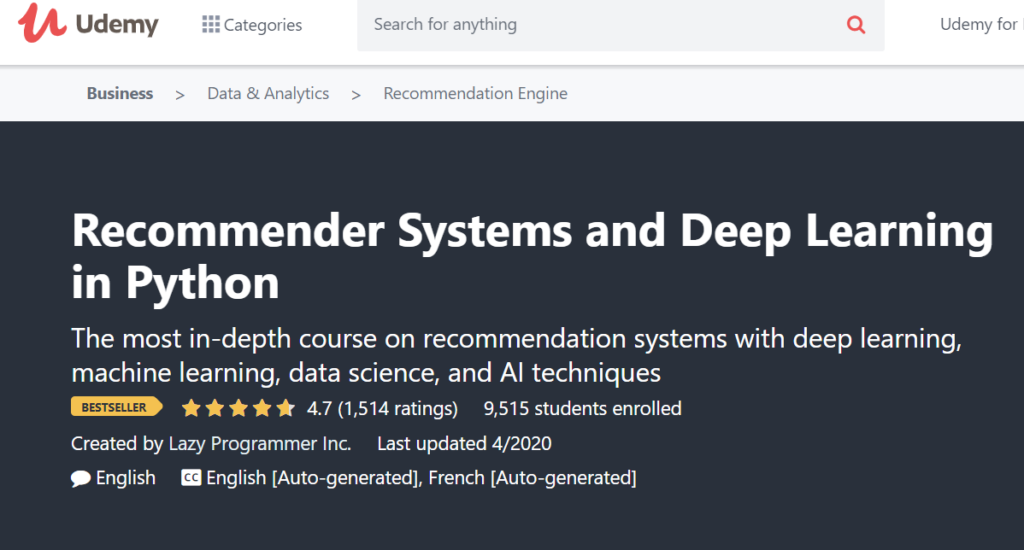
Believe it or not, almost all online businesses today make use of recommender systems in some way or another. What do I mean by “recommender systems”, and why are they useful? Let’s look at the top 3 websites on the Internet, according to Alexa: Google, YouTube, and Facebook. Recommender systems form the very foundation of these technologies. Google: Search results. They are why Google is the most successful technology company today. YouTube: Video dashboard. I’m sure I’m not the only one who’s accidentally spent hours on YouTube when I had more important things to do! Just how do they convince you to do that? That’s right. Recommender systems! Facebook: So powerful that world governments are worried that the newsfeed has too much influence on people! (Or maybe they are worried about losing their own power… hmm…) Amazing! This course is a big bag of tricks that make recommender systems work across multiple platforms. We’ll look at popular news feed algorithms, like Reddit, Hacker News, and Google PageRank. We’ll look at Bayesian recommendation techniques that are being used by a large number of media companies today.
Building Recommender Systems with Machine Learning and AI
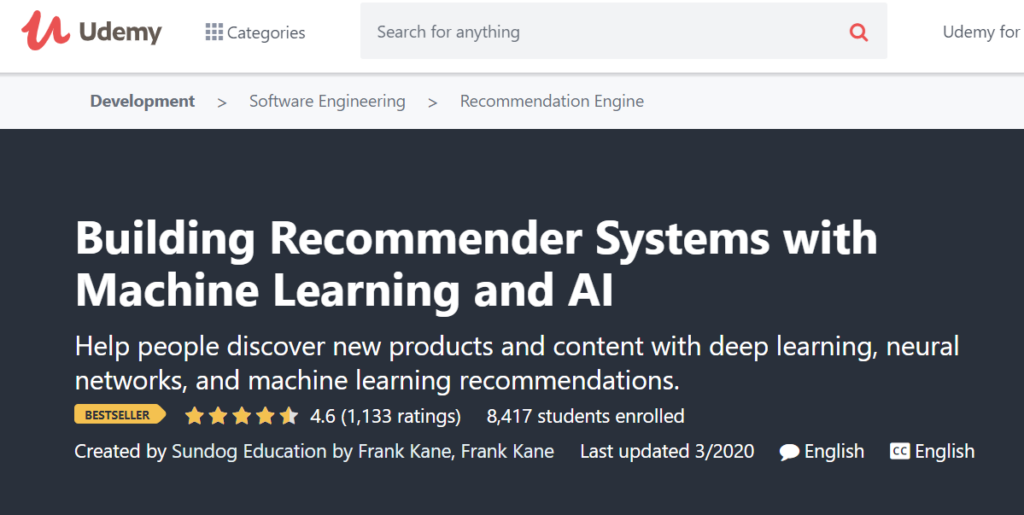
Frank Kane, author of the textbook Building Recommender Systems with Machine Learning and AI teaches you in this course:
how to build recommender systems from one of Amazon’s pioneers in the field. Frank Kane spent over nine years at Amazon, where he managed and led the development of many of Amazon’s personalized product recommendation technologies. You’ve seen automated recommendations everywhere – on Netflix’s home page, on YouTube, and on Amazon as these machine learning algorithms learn about your unique interests, and show the best products or content for you as an individual. These technologies have become central to the largest, most prestigious tech employers out there, and by understanding how they work, you’ll become very valuable to them. We’ll cover tried and true recommendation algorithms based on neighborhood-based collaborative filtering, and work our way up to more modern techniques including matrix factorization and even deep learning with artificial neural networks. Along the way, you’ll learn from Frank’s extensive industry experience to understand the real-world challenges you’ll encounter when applying these algorithms at large scale and with real-world data. Recommender systems are complex; don’t enroll in this course expecting a learn-to-code type of format. There’s no recipe to follow on how to make a recommender system; you need to understand the different algorithms and how to choose when to apply each one for a given situation. We assume you already know how to code. However, this course is very hands-on; you’ll develop your own framework for evaluating and combining many different recommendation algorithms together, and you’ll even build your own neural networks using Tensorflow to generate recommendations from real-world movie ratings from real people.
Learning Path: Build Your Own Recommendation Engines

With the progress in time, we do not have to rely on crystal balls any more to predict the future, we have data! Recommender systems or Recommendation Engines serve as the modern-day crystal balls, with the exception that all of the predictions made by them are backed by data! Recommender Systems also perform the task of filtering, prioritizing and efficiently delivering relevant information in order to alleviate the problem of information overload, which has created a potential problem to many users. With all these advantages, Recommendation Engines are very common these days and can be applied in almost every field. Packt’s Video Learning Paths are an amalgamation of multiple video courses that are logically tied together to provide you with a larger learning curve. In this course, you will be introduced to what a recommendation engine is and its applications. You will then learn to build recommender systems by using popular frameworks such as R and Python. The latter part of the Learning Path will deal with various complex recommendation engines such as personalized recommendation engines, real-time recommendation engines, and SVD recommender systems. You will also get a quick glance into the future of recommendation systems. By the end of this Learning Path, you will be able to build efficient recommendation engines by following the best practices. The course is taught by Suresh Kumar Gorakala, co-author of the book Building a Recommendation System with R.
Machine Learning Projects: Recommendation system website
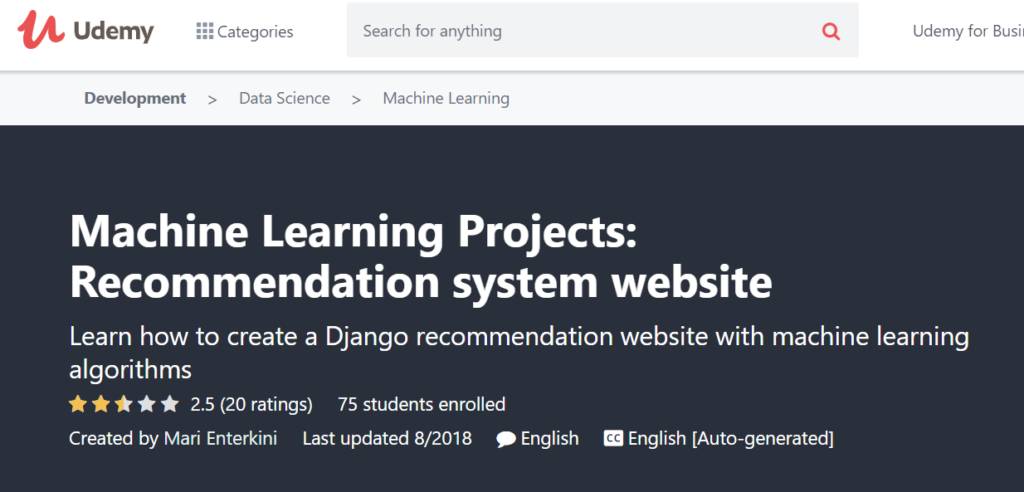
Recommendation systems are at the heart of almost every internet business today; from Facebook to Netflix to Amazon. Providing good recommendations, whether its friends, movies or groceries, goes a long way in defining user experience and enticing your customers to use your platform. This course shows you how to do just that, using machine learning algorithms and implement them to Django to create an attractive recommendation website. Taught by Mari Enterkini.
More Courses On Udemy about Recommender Systems
There are many courses more on Udemy, but most of them are rather short https://www.udemy.com/courses/search/?q=recommender%20systems
Other Courses
The ACM RecSys YouTube Channel
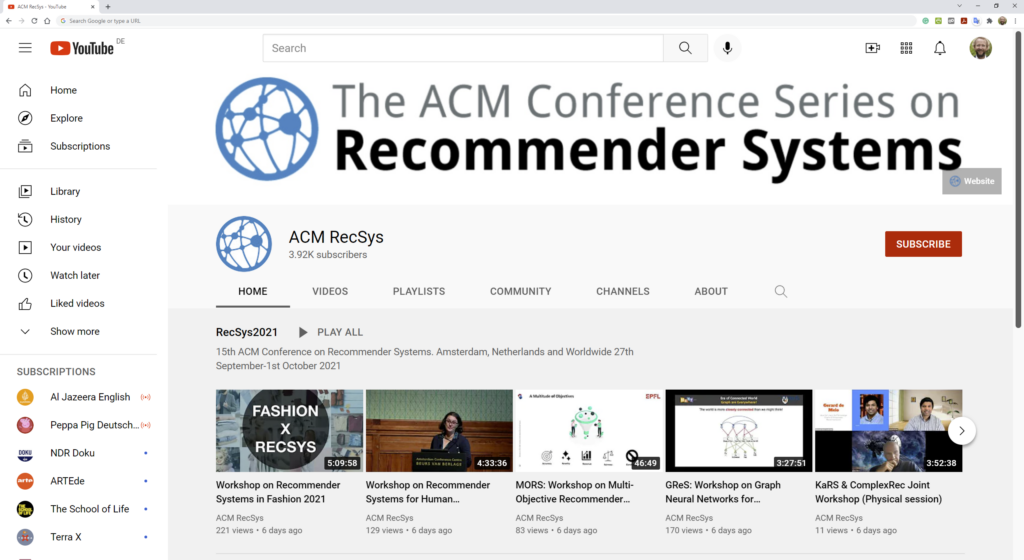
Not exactly a lecture, but a very worthwhile watch once you want to dig deeper into recommender systems: The official YouTube channel of the ACM Conference Series in Recommender Systems (ACM RecSys). The channel hosts many (all?) presentations given at the previous years’ ACM RecSys conferences, including some of the workshops.
‘Recommender Systems’ by Bluecourses
This course is given by Prof. Bart Baesens and Dr. Michael Reusens
In this course, participants learn the essentials of recommender systems. We start with an introduction to recommender systems and its applications. We then discuss the various ways and attention points of building a recommendation system. This is followed by an-depth discussion on collaborative filtering, one of the most popular ways of building recommender systems nowadays. We then discuss model based collaborative filtering, which relies on machine learning techniques to build recommendation systems. Next, we zoom in on matrix factorization to discover latent features in rating matrices. We then elaborate on content filtering and knowledge based filtering. We also discuss deep learning neural networks for building recommendation systems. The course concludes by reviewing recommendation system attacks, software and challenges.
The course provides a sound mix of both theoretical and technical insights, as well as practical implementation details. These are illustrated by several real-life case studies and examples. Throughout the course, the instructors also extensively report upon their research and industry experience.
Examples are given in Python both as Jupyter notebooks and plain Python code which the participants can easily copy/paste and run in their own Python environments.
The course features more than 3.5 hours of video lectures, more than 50 multiple choice questions, and various references to background literature. A certificate signed by the instructors is provided upon successful completion.
News From Our Blog About Recommender-Systems Online-Courses
Andrew Ng introduces a new (free) course on Vector Databases by Sebastian Witalec
Update 2023-11-16: I attended the course, and, unfortunately, am not very convinced. The course is rather superficial and in the beginning, many basic details are covered that most people from the IR and RecSys community probably know already. The latter part of the course also seems a bit like an advertisement video for the Weaviate […]
Free MOOC on Automated Machine Learning (AutoML)
Automated Machine Learning (AutoML) is one of the techniques that will greatly advance recommender systems in the near future (see also AutoRecSys). Recently, there was a free open access book published on AutoML by Frank Hutter, Lars Kotthoff, and Joaquin Vanschoren. Just a few days ago, a new free online lecture on AutoML was announced […]
Amazon’s so-far private Machine Learning ‘University’ offers courses for everyone
Douglas Gantenbein from Amazon announced that Amazon would publish some machine learning courses. So far, these courses were only available to Amazon staff. There will be three courses on Natural Language Processing (NLP), taught by Cem Sazara, an Amazon applied scientist Computer Vision, taught by Rachel Hu, AWS applied scientist Tabular data, taught by Paula […]
NVIDIA launches “Building Intelligent Recommender Systems” online course
NVIDIA announced in their Blog to offer several new online courses, one of them about Building Intelligent Recommender Systems. The courses are taught by James Maki, Senior Deep Learning Data Scientist at NVIDIA, and by Adam Henryk Grzywaczewski, Senior Deep Learning Solution Architect at NVIDIA. The course will teach you to create “different types of […]
The Ultimate Guide to Natural Language Processing Courses [Airev.us]
Natural Language Processing (NLP) is a crucial element for the development of many recommender systems. Most recommender systems text-books and online courses cover NLP only superficially. Hence, for those being interested in learning more about NLP the guide “Choosing the right course for a Practical NLP Engineer” might be informative. Although, opinions about the validity […]
